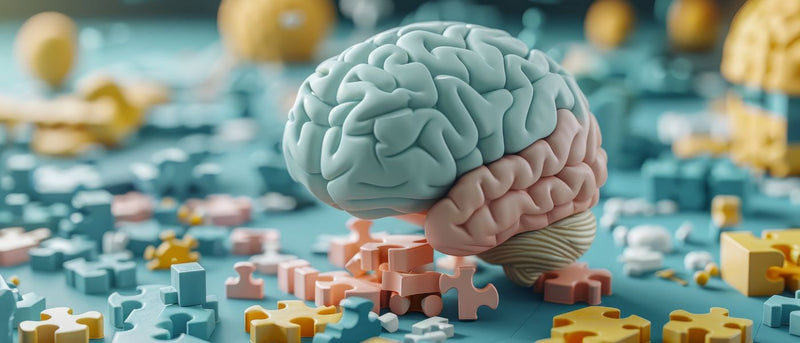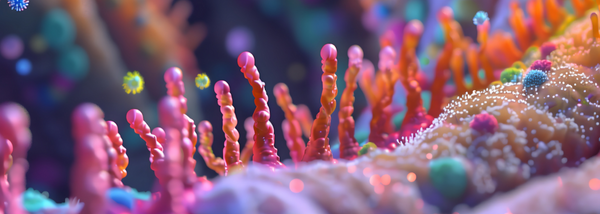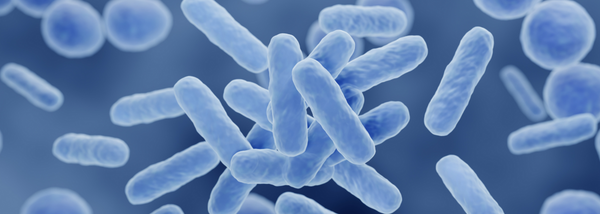
The Lipid Membrane: The Unsung Hero of Cellular Health
The cell membrane, a lipid bilayer just a few nanometers thick, plays a critical role in cellular function by regulating nutrient transport, immune signaling, and maintaining overall cell integrity. Essential fatty acids, like omega-3 and omega-6, are crucial for maintaining membrane fluidity and functionality, which supports energy production, cellular communication, and resistance to degenerative disease.


The Top Brain Exercises to Improve Cognitive Function


Best Foods for Brain Health: Support Memory, Concentration, & Anti-Aging

Environmental Toxins & Their Effects on Health

How to Navigate Election Anxiety & Support Your Mental Health Through Election Season

The Best Hair, Skin, and Nails Vitamins for Total Beauty Transformation
We all want stronger nails, glowing skin, and fuller hair, but finding supplements that actually deliver results can seem overwhelming. Which ingredients are science-backed? How do you know what your body really needs? And most importantly, which vitamins go beyond surface-level improvements to create lasting change? In this guide, we’re cutting through the noise to highlight what matters most: the right nutrients, in the right forms, working at the cellular level to support long-term beauty and health from within.
Natural Ways to Cleanse and Restore Your Gut
Your gut does more than digest food—it acts as a command center for many vital functions in your body. With 70–80% of immune cells residing in the gut, there is a powerful connection between gut health, the microbiome, and both local and systemic immune responses. Emerging science shows that nutrition directly influences the composition of the gut microbiota, thereby impacting immunity and the body's ability to fend off infectious diseases.
What Is Brain Retraining? 7 Things to Expect When You Start
Your brain is powerful, capable of adapting, learning, and even healing in the face of chronic stress or illness. But what happens when that same adaptability starts working against you? That’s where brain retraining comes in.
What to Know About Gut Microbiome Testing: 7 Things to Expect (And What to Do Next)
Your gut microbiome is one of the most powerful ecosystems in your body — influencing digestion, immunity, mood, metabolism, and even brain health. So it makes sense that gut microbiome testing has become a recent trend. But if you’re thinking about testing your gut microbiome, it helps to know what you’re really getting (and not getting) from those results. Gut testing can offer valuable insights — but the test alone won’t heal your gut. True gut health starts with rebuilding the gut lining and supporting your gut’s foundational health.
7 Sneaky Ways Chlorine Exposure Impacts Your Body (Plus 6 Ways to Protect Yourself)
Chlorine is one of the most commonly used disinfectants in the world — and for good reason. Its ability to neutralize harmful bacteria and pathogens makes it an essential tool for maintaining clean, safe swimming environments. But, while chlorine plays an important role in public health, repeated exposure to chlorinated water may also have unintended effects on the body.
Functional Thiamine (B1) Deficiency: 7 Signs You Shouldn’t Ignore
Thiamine is a vital nutrient involved in many of the body’s core processes, including energy production, nervous system signaling, and digestive regulation. A growing number of individuals are experiencing what's known as functional thiamine deficiency — when the body struggles to utilize thiamine effectively. This often leads to subtle but disruptive symptoms that can be difficult to trace back to a single cause.
Digestive Enzymes vs. Probiotics: What’s the Difference & Which One Do You Need?
Your pancreas, stomach, and small intestine naturally produce these enzymes, but many people experience enzyme insufficiencies due to stress, age, or chronic conditions. Enzyme supplements can help compensate and support more efficient digestion, especially for those with bloating, gas, or food intolerances.
How Long Does Magnesium Citrate Stay in Your System?
Magnesium citrate is a highly bioavailable form of magnesium, absorbed in the small intestine and excreted by the kidneys. What isn’t absorbed contributes to its osmotic laxative effect, drawing water into the colon and triggering a bowel movement.
Magnesium vs. Magnesium Citrate: What’s the Difference?
Magnesium is a vital mineral involved in more than 300 enzymatic reactions in the body. It plays a role in energy production, DNA synthesis, nerve function, muscle contraction, and maintaining a healthy heartbeat. Despite its importance, many people don't get enough magnesium through their diet. Symptoms of deficiency can include fatigue, muscle cramps, poor sleep, and anxiety.












